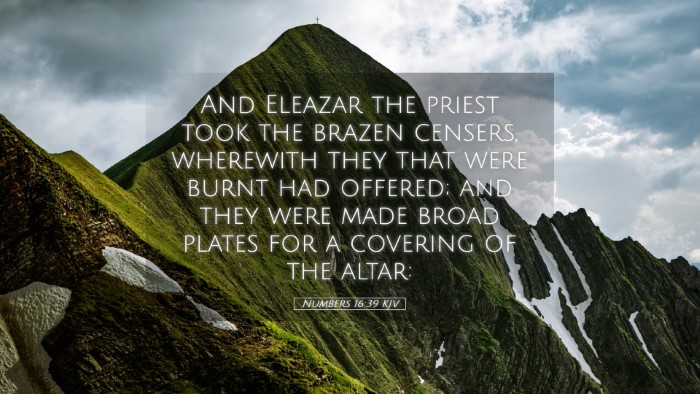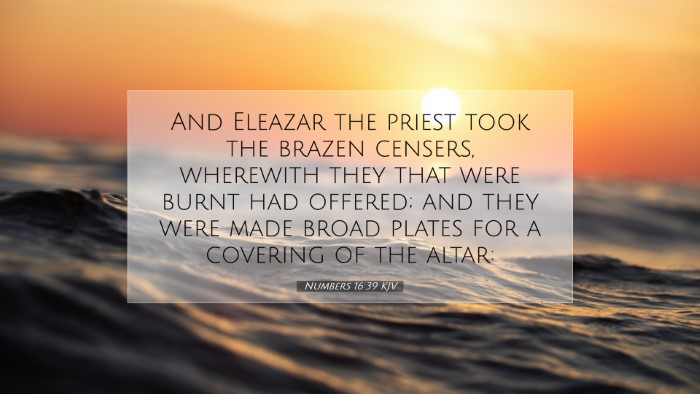Commentary on Numbers 16:39
In Numbers 16:39, we encounter a pivotal moment in Israel's journey through the wilderness, where the unfolding drama of leadership, authority, and divine judgment is starkly portrayed. This verse states:
"And Eleazar the priest took the brasen censers, wherewith they that were burnt had offered; and they were made broad plates for a covering of the altar."
Context and Background
To fully appreciate the significance of this verse, we must consider the broader context of Numbers 16, where rebellion arises against God’s appointed leadership. Korah, Dathan, and Abiram challenge Moses and Aaron, leading to a dramatic display of God’s judgment. Their revolt highlights issues of pride and the danger of undermining divinely established order.
Commentary Insights
1. The Role of Eleazar the Priest
Matthew Henry emphasizes the essential role of Eleazar in mediating between God and the people. As a priest, Eleazar represents the continuity of divinely ordained leadership after the judgment on Korah's followers. His actions in handling the censers signifies a transition from rebellion to reverent worship, reminding the community of the importance of holy service.
2. The Brass Censers
The brass censers, which were instruments used in the offering of incense, become symbolically significant. Albert Barnes notes that these censers, once instruments of defiance, are transformed into a memorial. This demonstrates God’s supremacy and sovereignty, as even the implements of rebellion can be utilized for divine purposes. The act of converting these censers into plates for the altar signifies that God can redeem and repurpose even the most egregious acts of rebellion into instruments of His glory.
3. A Memorial to the People
The broad plates created from the censers serve as a lasting reminder to the people of Israel. Adam Clarke points out that these plates symbolize the divine judgment that was executed and serve as a cautionary tale against rebellion. Clarke discusses the importance of reminders in spiritual life, noting that these plates were not only reflective of judgment but were also a call to humility and reverence for God's appointed leaders.
4. The Altar as a Place of Atonement
The altar, already a symbol of sacrifice and atonement, is further highlighted through the introduction of the bronze plates. Matthew Henry reflects on how these plates remind the Israelites that their standing before God is contingent upon humble submission and correct worship practices. It illustrates the transition from rebellion to a restored relationship with God through proper sacrifice and worship.
5. Theological Implications
- Authority and Leadership: This incident reinforces the necessity of adhering to divinely established authority within the Church. The chaos that ensues from challenging this order serves as a warning to contemporary believers.
- Divine Judgment and Mercy: God’s judgment may be severe; however, His mercy is always intertwined within His justice. The transformation of the censers points toward the hope of redemption.
- Remembrance in Worship: The importance of memorials in worship practices is underscored. Just as Israel remembered this act, Christians are called to remember the sacrificial nature of Christ’s work.
Practical Applications
From this passage, several practical applications emerge for pastors, students, theologians, and Bible scholars:
- Teach the importance of proper worship: Ensure church practices align with Biblical teachings and foster community loyalty to God’s established leadership.
- Encourage a historical understanding of faith: Use passages like these to promote an understanding of how past events inform current beliefs and practices.
- Highlight the power of redemption: Remind congregants that no one is beyond God’s reach for redemption, even those who rebel.
Conclusion
Numbers 16:39, while a brief verse, encapsulates profound theological truths about leadership, rebellion, redemption, and worship. By examining the transformation of the censers and their memorial use, we uncover layers of meaning that resonate deeply with our faith journey. It calls every believer to a place of humility before God, a recognition of His holy authority, and an understanding of the transformative power of His grace.


